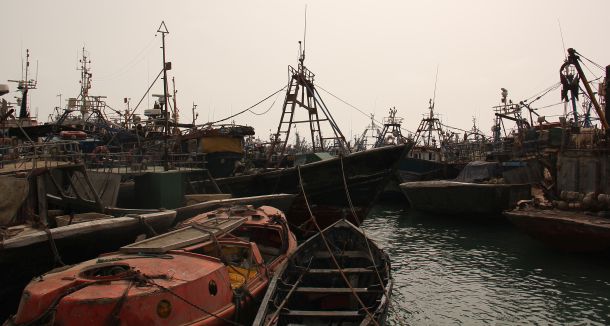
Here are all vessels that transported petroleum products from Spanish refineries into occupied Western Sahara last year.
Photo above: The tanker Imrikly spotted in Gibraltar on 13 June 2020, during one of its voyages from Spain to Western Sahara. At this occasion, it was heading from Carteya Guadarranque to Dakhla, where it arrived on 19 June. At the time, Imrikly belonged to the Moroccan company Derhem, but has later changed hands to a Greek company and changed name. Since the ownership change, the vessel has not returned to Western Sahara.
WSRW's has earlier covered Derhem's partership with Wisby Tankers. The group could also have some sort of agreement with the French company that owns the vessel Mayoury.
Around half a million tonnes of petroleum products arrived in occupied Western Sahara during the calendar year of 2020. This is the conclusion of an analysis that Western Sahara Resource Watch (WSRW) has made.
The calculation is based on the travel routes of 23 different vessels that arrived in the territory with such probable cargo during the year. The vessels stopped a total of 81 times in El Aaiún and 75 times in the port or anchorage area of Dakhla. Some of the import incidents included calls to both two ports.
Petroleum products are essential for Morocco to maintain the occupation of the territory. The petroleum products arriving in Western Sahara serve primarily to fuel vehicules, engines and vessels taking part in the illegal plunder of the territory, or used for military purposes by the Moroccan army.
Estimation of the total quantity of oil for 2020 is 521 759 tonnes. The calculation is based on the size of each vessel and its shipment route. In addition, the changes in draught have been taken into account. A draught explains the distance from the waterline down to the bottom of the vessel, and changes in this distance explain a vessel’s discarding or loading.
The volume is somewhat lower than the one WSRW observed for the calendar year 2019, which was 757,500 tonnes. The reason for the decrease might be solely due to a far more conservative WSRW methodology for calculating cargo onboard the vessels, applied from the year 2020.
Four large players in the 2020 transports, each accounting for around 18-19 percent of the total imports.
- Wisby Tankers from Sweden, with a fleet of two Norway-flagged vessels. The company has not responded to letters.
- The vessel ASC, in the fleet of Turkish shipping company Torlak Shipping.
- The vessel Imrikly. After the ship in 2021 was sold to the Greek shipping company Seaven (and changed name to Seaven Hope), it has not returned to the occupied territory.
- French company Sogestran, controlling the vessel Mayoury. The company has not responded to a WSRW letter.
Article continues under the table.

It is possible that the overview is not complete, and that certain arrivals have escaped WSRW’s attention.
The known points for picking up the cargoes are in the Spanish ports of Carteya, Ceuta, Las Palmas, Tenerife, Huelva and Cartagena. All ports - except the latter - are associated with refineries of the Spanish company Cepsa. Cartagena port is most likely associated with Repsol. WSRW wrote Cepsa in 2014 and in 2017, and 30 October 2018. A short response from the company on 8 November 2018 to our latest letter fails to respond to the questions asked in 2014 and 2017.
The tankers fly the following flags: Marshall Islands (3), Italy (2), Panama (1), Malta (8), Luxembourg (1), Morocco (2), Norway (2), France (3) and Barbados (1).
The real origin of the cargo is not known. However, the last ports of call of the ships are all in Spain or Morocco.
Spain: Algeciras (1), Cartagena (43), Carteya (34), Ceuta (2), Huelva (15), Las Palmas (2), Tenerife (14), Unknown (Algeciras or Carteya - 2)
Morocco: Casablanca (1), Jorf Lasfar (4),
The 23 petroleum tankers involved in the transports for the calendar year 2020 are: Asc, At Lucky, Atlantis Alicante, Atlantis Arki, Aziz Torlak, B. Sun, B.Ocean, Bice Amoretti Bomar Mars, C Force, Cosmo, Fs Clara, Guroni, Guyenne, Imrikly, Lamentin, Mayoury, Rekon, Sichem Amethyst, Sichem Ruby, Tingis, Wisby Argan and Wisby Cedar.
One observed vessel has not been included in the 2020 overview, the vessel Silver Kenna (IMO 9427524, Denmark-flagged), as its cargo has not been verified.
WSRW in June wrote about the gas exports to the territory for 2020.
First overview of gas imports into occupied Western Sahara
50,000 tonnes of liquified gas arrived in occupied Western Sahara last year, according to our first overview of this key trade.
New report: Sweden must advise companies on Western Sahara
Sweden is known for paying lip-service to Saharawi self-determination, but is it putting its money where its mouth is? Check out our newly published report on Sweden's involvement in the taking of occupied Western Sahara's natural resources.
Wisby Tankers continues fueling occupation of Western Sahara
New controversial energy infrastructure to be built in Western Sahara
The Moroccan government has opened for a relatively large tender in Dakhla.



